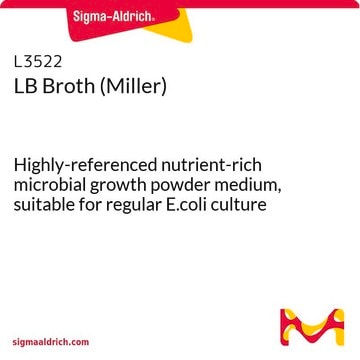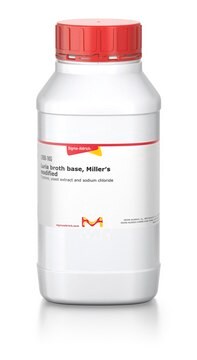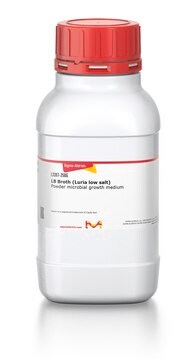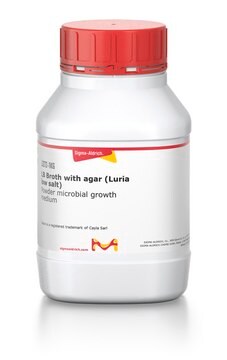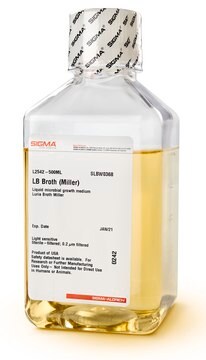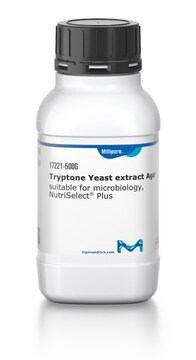L2025
Luria Agar Base, Miller
Tryptone, yeast extract, sodium chloride and agar
Synonym(s):
LA, modified, Luria-Bertani media, modified, Lysogeny broth, modified
Sign Into View Organizational & Contract Pricing
All Photos(2)
About This Item
UNSPSC Code:
41106200
eCl@ss:
42040102
NACRES:
NA.72
Recommended Products
Quality Level
form
powder
technique(s)
microbiological culture: suitable
application(s)
agriculture
microbiology
General description
Luria Bertani (LB) medium is one of the complex media that is widely used to grow Escherichia coli in small-scale cultures.
Application
Luria Agar Base, Miller has been used as a growth medium during plasmid amplification. It has also been used as a culture medium for strains of Penicillium sp. laika.
Luria broth/agar (LA), Miller (L1900) is a bacteria growth mixture of sodium chloride (0.5g/L); tryptone (10g/L) yeast extract (5g/L) and agar (15g/L) used to culture members of the Enterobacteriaceae family and for coliphage plaque assays.
Components
Contains: Tryptone, yeast extract, sodium chloride and agar.
Reconstitution
Recommended use at 30.5 g per liter.
Storage Class Code
11 - Combustible Solids
WGK
WGK 3
Flash Point(F)
Not applicable
Flash Point(C)
Not applicable
Certificates of Analysis (COA)
Search for Certificates of Analysis (COA) by entering the products Lot/Batch Number. Lot and Batch Numbers can be found on a product’s label following the words ‘Lot’ or ‘Batch’.
Already Own This Product?
Find documentation for the products that you have recently purchased in the Document Library.
Customers Also Viewed
Xiaoyun Qiu et al.
Applied and environmental microbiology, 70(11), 6435-6443 (2004-11-06)
We systematically investigated the physiological response as well as DNA damage repair and damage tolerance in Shewanella oneidensis MR-1 following UVC, UVB, UVA, and solar light exposure. MR-1 showed the highest UVC sensitivity among Shewanella strains examined, with D37 and
C Niu et al.
Applied and environmental microbiology, 70(12), 6951-6956 (2004-12-03)
The specific biofilm formation (SBF) assay, a technique based on crystal violet staining, was developed to locate plant essential oils and their components that affect biofilm formation. SBF analysis determined that cinnamon, cassia, and citronella oils differentially affected growth-normalized biofilm
Anthony S Danko et al.
Applied and environmental microbiology, 70(10), 6092-6097 (2004-10-07)
Pseudomonas putida strain AJ and Ochrobactrum strain TD were isolated from hazardous waste sites based on their ability to use vinyl chloride (VC) as the sole source of carbon and energy under aerobic conditions. Strains AJ and TD also use
Daria Julkowska et al.
Journal of bacteriology, 187(1), 65-76 (2004-12-17)
The natural wild-type Bacillus subtilis strain 3610 swarms rapidly on the synthetic B medium in symmetrical concentric waves of branched dendritic patterns. In a comparison of the behavior of the laboratory strain 168 (trp) on different media with that of
Yong-Guy Kim et al.
BMC microbiology, 11, 119-119 (2011-05-31)
Bacteria use diverse signaling molecules to ensure the survival of the species in environmental niches. A variety of both gram-positive and gram-negative bacteria produce large quantities of indole that functions as an intercellular signal controlling diverse aspects of bacterial physiology.
Our team of scientists has experience in all areas of research including Life Science, Material Science, Chemical Synthesis, Chromatography, Analytical and many others.
Contact Technical Service
